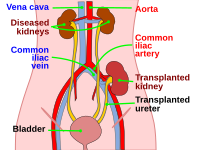
Photo from wikipedia
INTRODUCTION: Understanding the problems experienced and coping strategies used after the heart transplantation, health care providers may help heart transplant recipients’ adaptation to the postoperative period and consequently improve their… Click to show full abstract
INTRODUCTION: Understanding the problems experienced and coping strategies used after the heart transplantation, health care providers may help heart transplant recipients’ adaptation to the postoperative period and consequently improve their quality of life. However, there is little qualitative evidence on how heart transplant recipients develop coping strategies and adapt to postoperative life.AIM: The aims of the study were a) to identify the physical and psychosocial problems experienced by heart transplant recipients and b) to identify coping strategies used by heart transplant recipients.METHODS: A grounded theory research approach was used in data collection and analysis for studying heart transplant recipients’ experience. The participants in this study were 42 heart transplant recipients. The data were gathered by taped, unstructured, in-depth interviews. Constant comparison analysis was used to interpret the data.FINDINGS: Four categories developed from the data analysis, namely: “traumatic experience” “that’s a small price to pay for being alive” “somebody else’s heart inside me” and “coping”. The central or core category, “That’s a small price for being alive Vs Too big a price to pay for being alive” emerged and was the main theme around which other categories were integrated. Further interpretation of findings led to the development of a theory entitled “Price to pay for being alive: Coping with the post-operative demands in Heart Transplantation”.CONCLUSION: The theory developed within the frame of this study offers an extension of Moos’ Crisis Theory, and applies his basic concepts of major life crises and transitions with adaptations, to heart transplant patients. One such adaptation is the assertion that the factors that influence how adaptively an individual copes with a heart transplant crisis are different from any other health crisis.
Journal Title: Global Journal of Health Science
Year Published: 2017
Link to full text (if available)
Share on Social Media: Sign Up to like & get
recommendations!